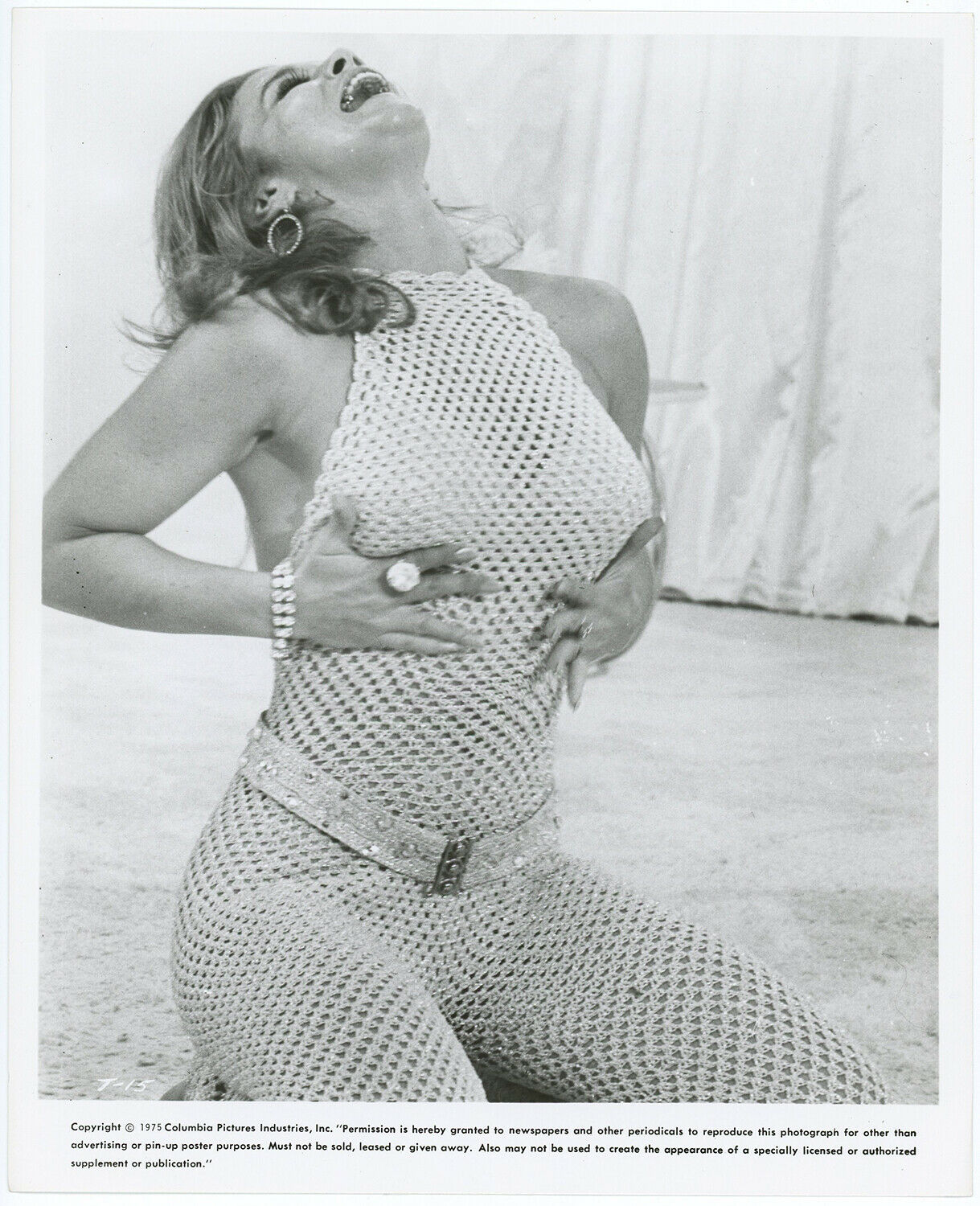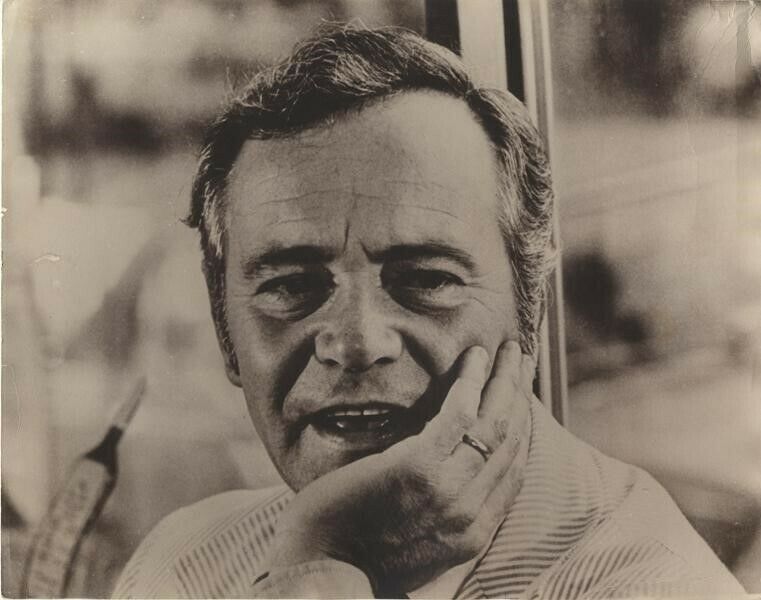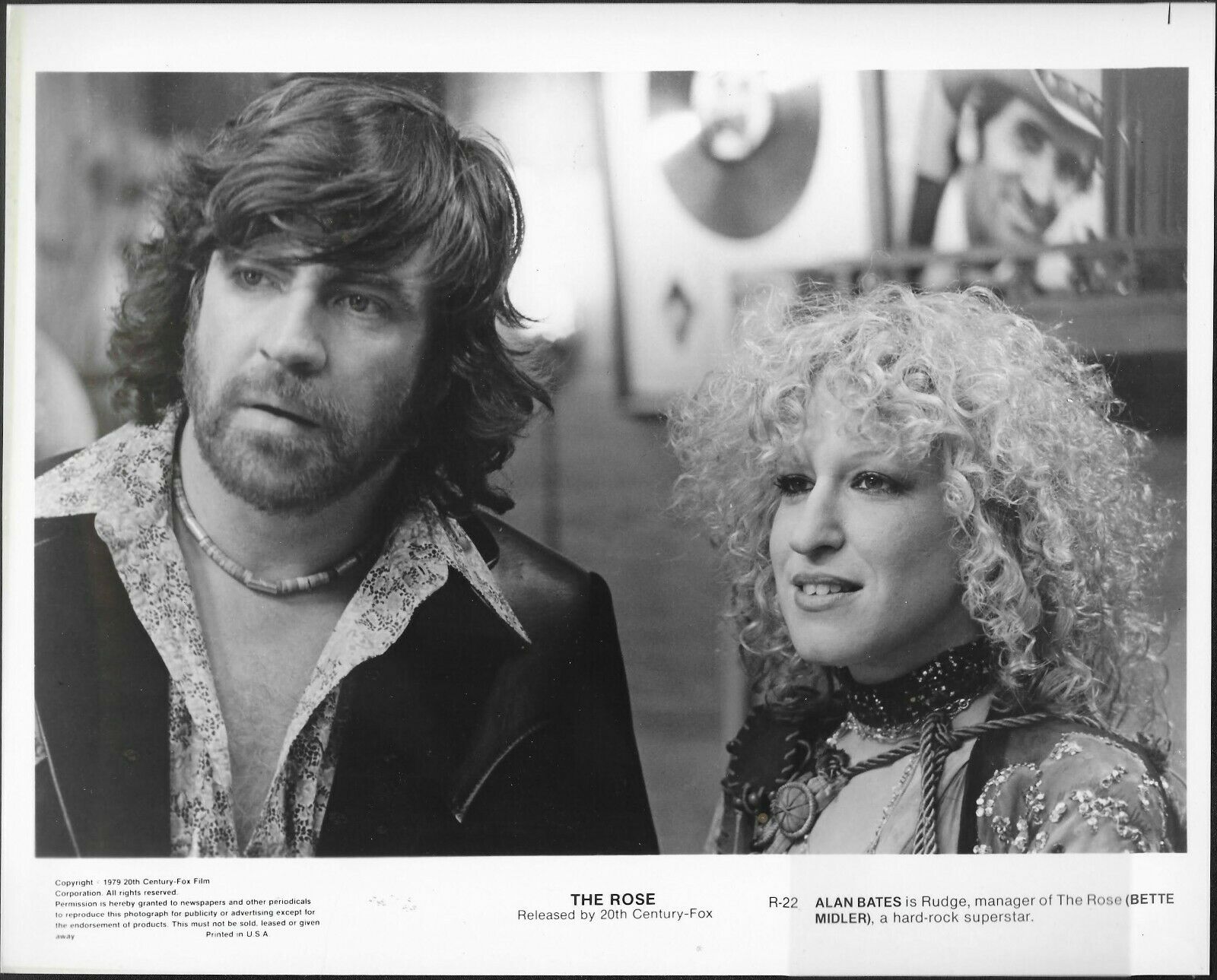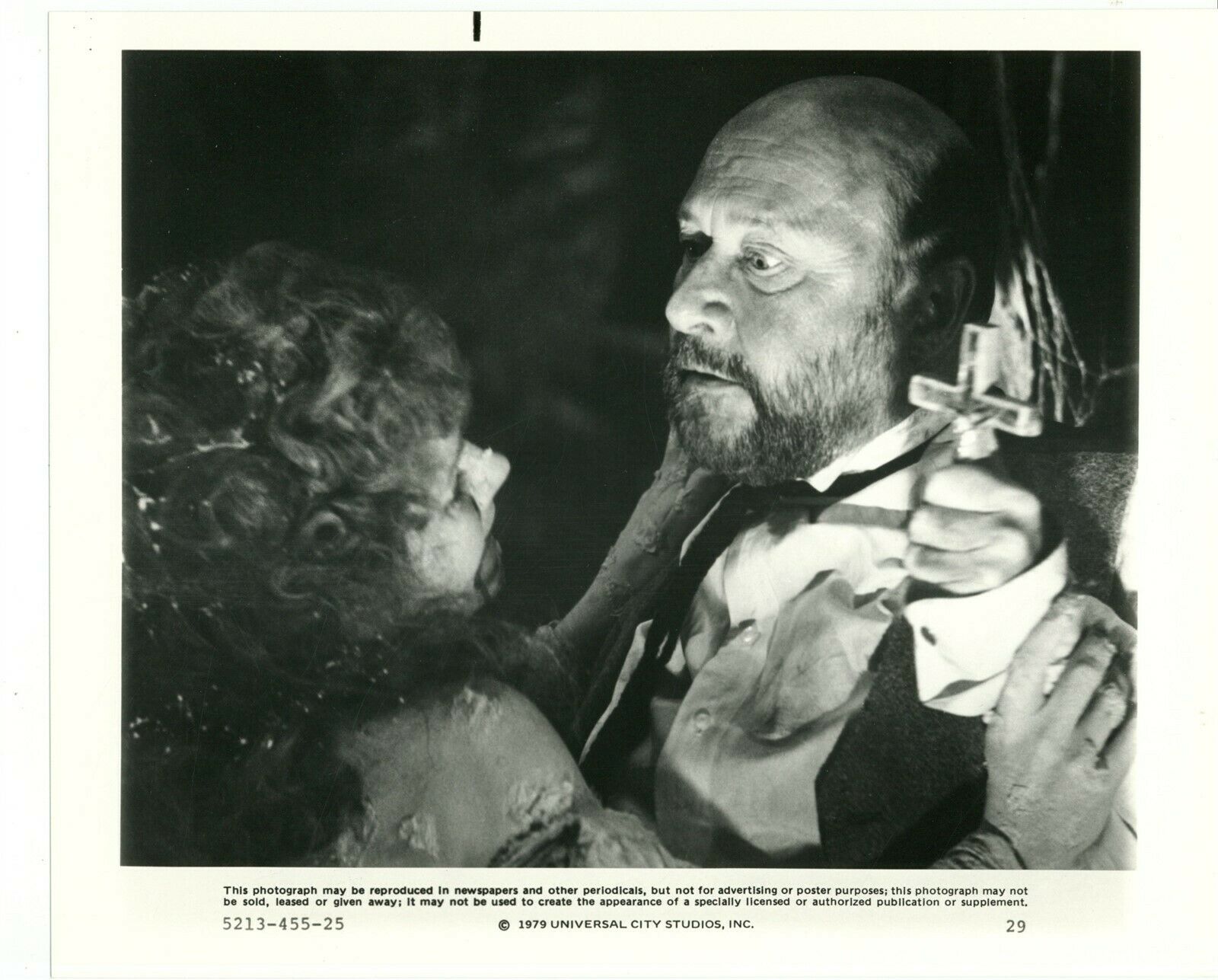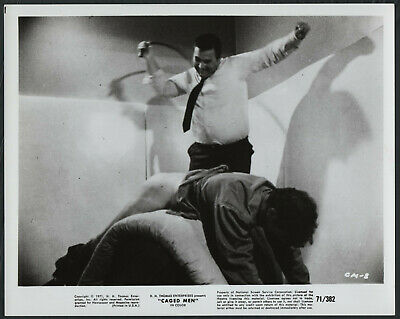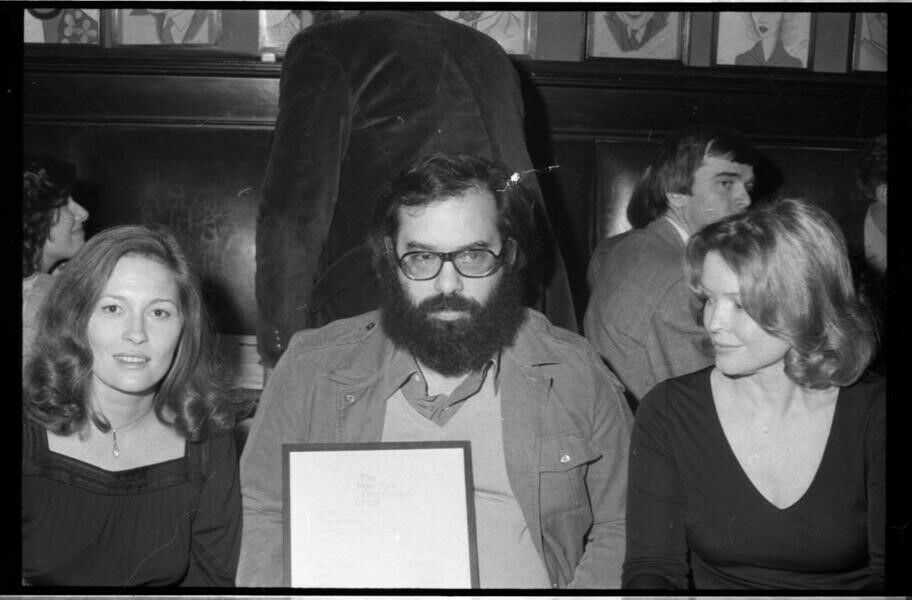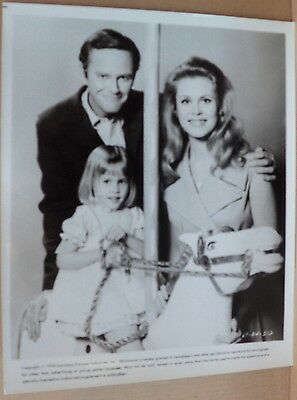-40%
Swedish Sex Bomb Ann-Margret in Tommy 1975 Original Production Still Photograph
$ 5.54
- Description
- Size Guide
Description
ITEM: This is a vintage and original Columbia Pictures production still photograph from the 1975 British satirical operetta fantasy drama film "Tommy." The film is based upon The Who's 1969 rock opera albumTommy
about a "psychosomatically deaf, mute, and blind" boy who becomes a pinball champion and religious leader. The film featured a star-studded ensemble cast, including the band members themselves (most notably, lead singer Roger Daltrey, who plays the title role), Ann-Margret, Oliver Reed, Eric Clapton, Tina Turner, Elton John, and Jack Nicholson. Ann-Margret, in all her sex bomb glory, is pictured here in a crocheted body suit as she throws her head back and runs her hands across her torso during a scene from the film.
Born in Sweden, Ann-Margret came to the United States with her parents after World War II and moved to the West Coast with her singing group around 1959. George Burns helped launch her singing career, and she soon went on to acting, starring alongside big names such as with Elvis Presley, Jack Nicholson and John Wayne, earning an Oscar nomination for Carnal Knowledge.
Photograph measures 8" x 10" on a glossy single weight paper stock.
Guaranteed to be 100% vintage and original from Grapefruit Moon Gallery.
More about Ann-Margret:
Dismissed in the 1960s as a mere "sex kitten," Ann-Margret's career outlived her hip-swiveling breakout and over the next four decades proved her tremendous talent and staying power as a singer, dancer and fine dramatic actress. She began her career on the cabaret stage, which she revisited throughout her life as a Las Vegas entertainer and TV variety show host. Her sizzling style was first showcased in the Elvis vehicle "Viva Las Vegas" (1964) as well as "Bye Bye Birdie" (1963), both of which showcased her intriguing beauty, sultry voice and high energy dancing. In the 1970s, she earned respect as a dramatic actress with her Oscar-nominated role in Mike Nichols' "Carnal Knowledge" (1971) and her Golden Globe-winning performance in the rock opera, "Tommy" (1975). The triple-threat's prolific era of made-for-TV movies included a dozen Golden Globe and Emmy Award nominations for movies like "A Streetcar Named Desire" (ABC, 1984) and "Queen" (CBS, 1993). Through comedic performances, Ann-Margret experienced a big screen resurgence the following decade, revisiting her sexy image to play a middle-aged heartbreaker in the two-picture series, "Grumpy Old Men" (1993, 1995), and introducing herself to a new generation with "mother" roles in mainstream comedies like "The Break-up" (2006) and "The Santa Clause 3" (2006). With her old-school foundation as a well-rounded "entertainer" and a screen versatility that allowed her to toss off sassy one-liners or elicit sympathy as a woman in crisis, Ann-Margret was a revered member of Hollywood's old guard.
Born Ann-Margaret Olsson in Stockholm, Sweden on April 28, 1941, the redhead who would one day be known simply as Ann-Margret spent the first five years of her life in her native country before her electrician father was offered a job in stateside. The family settled near Chicago, IL; first in Fox Lake, then in Wilmette where they lived in the funeral home where her mother worked as a receptionist. As a vivacious pre-teen, Ann-Margret began entering talent contests, taking her singing and dancing to national television at age 16 on "The Amateur Hour" (DuMont Network, 1946-49; NBC, 1949-1954; ABC, 1955-57). She joined a number of professional bands while still in school, but in 1960, George Burns discovered the cabaret performer singing and playing the maracas in the lounge of the Dunes Hotel in Las Vegas. Impressed with her presence, the comedian hired her for 0 per night to perform in his Christmas show at the Sahara Hotel. After landing a recording contract with RCA and releasing the first of many albums in 1961, she made her feature debut as Bette Davis' daughter in Frank Capra's wet-blanket remake, "A Pocketful of Miracles" (1961). The effort earned the actress a Golden Globe Award for Best Newcomer, and though her follow-up, a remake of "State Fair" (1962), bombed, she became the "It girl" of the moment when she sang the Oscar-nominated song "Bachelor in Paradise" at the 34th annual Academy Awards.
With her youthful, high-energy dancing style and breathy vocals, Ann-Margret helped resuscitate the nearly comatose Hollywood musical with her role as the small-town girl chosen to kiss a rock star in "Bye Bye Birdie" (1963). She also played a key role in making "Viva Las Vegas" (1964) Elvis Presley's best musical, matching the King step-for-step in the talent and sex appeal departments. The project also sparked a romance between the pair, who parted as friends and remained close confidantes throughout Elvis' tumultuous life. However "Bye Bye Birdie" and "Viva Las Vegas" were the high points of a flurry of forgettable films cranked out to capitalize on Ann-Margret's sex bomb image. She tackled her first serious role in the uninspired "Kitten with a Whip" (1964), playing a tough, conniving escapee from a reformatory; though some noticed the beginnings of a dramatic actress, most refused to take her seriously. A steady diet of fluff ensued until her 1967 marriage to Roger Smith, the former star of "77 Sunset Strip" (ABC, 1958-1964) who took over her management in partnership with Allan Carr. Smith and Carr groomed Ann-Margret as a variety artist, which begat a decade-long series of highly enjoyable musical-comedy TV specials, beginning with "The Ann-Margret Show" (CBS, 1968). She further survived the death of the Hollywood musical by becoming a staple of the Las Vegas scene where such productions still thrived, selling out shows weeks in advance.
During the 1970s, the cultural icon that had inspired and voiced Ann-Margrock on an episode of "The Flintstones" (ABC, 1960-66) finally won respect as a dramatic actress. Her powerful supporting performance as Jack Nicholson's neglected wife in Mike Nichols' "Carnal Knowledge" (1971) brought, in the words of one critic, "the only sign of humanity" to the picture. She would go on to win a Golden Globe and earn an Oscar nomination for the role. A life-threatening, 22-foot fall from a stage in 1972 temporarily disrupted her career and put the entertainer in a coma for three days, but she made a triumphant Las Vegas comeback an astonishing 10 weeks later. The high-profile accident brought in a staggering 51 million viewers to watch her "comeback" TV variety special, "Ann-Margret: When You're Smiling" (NBC, 1973), the following year. She went on to realize her dream of playing opposite John Wayne by landing role in the relaxed Western "The Train Robbers" (1973), following it up with a surprising and intense performance as deaf, dumb, and blind kid Roger Daltrey's mother in the rock musical "Tommy" (1975), for which she earned an Oscar nomination for Best Actress. Though Ann-Margret remained busy during the late-1970s, few good roles and films presented themselves, with her acclaimed performance opposite Anthony Hopkins in Richard Attenborough's "Magic" (1978) outnumbered by lame comedies like "Middle Age Crazy" (1980).
Since meaty feature fare was at a minimum for aging actresses, Ann-Margret turned to television during the '80s as an outlet for her dramatic talent. Her TV movie debut, "Who Will Love My Children?" (ABC, 1983), was a stunner that earned her a Golden Globe for Best Actress in a Miniseries or Motion Picture Made for Television. Encouraged by director John Erman to shed her glamour image to play the part of a cancer-stricken single mother who tries to place her 10 children with new families before she succumbs, Ann-Margret garnered the first of her many forthcoming Emmy nominations. The following year, she offered a Golden Globe-winning interpretation of Blanche DuBois alongside Treat Williams and Beverly D'Angelo in a TV adaptation of "A Streetcar Named Desire" (ABC, 1984). She gave another excellent performance as a complicating member of a trio in the feature film "Twice in a Lifetime" (1985), as "the other woman" who comes between married couple Gene Hackman and Ellen Burstyn. Ann-Margret's TV career continued steadily with the actress bringing some class to the enjoyably trashy Dominick Dunne-adapted miniseries, "The Two Mrs. Grenvilles" (NBC, 1987), and holding her own opposite Julie Andrews in the touching AIDS drama "Our Sons" (ABC, 1991). These two TV films plus the follow-up miniseries, "Queen" (CBS, 1993) and the misbegotten "Gone with the Wind" (1939) sequel "Scarlett" (CBS, 1994), were all helmed by Erman, whose partnership with Ann-Margret yielded the actress four Emmy nominations altogether.
As she reached the half-century mark, the multi-faceted entertainer returned to the stage, starring in the biggest production ever staged by a single performer at Radio City Music Hall in 1991. Her profile boost continued with her biggest feature film success in years, as the attractive bone of contention between famous screen team Jack Lemmon and Walter Matthau in "Grumpy Old Men" (1993). Hot on the heels of that major box office success, she released the bestselling memoir, Ann-Margret: My Story for a reported million publishing deal. She re-teamed with her co-stars for the equally popular sequel "Grumpier Old Men" in 1995. At this time, the actress kicked off a producing career through Ann-Margret Productions, creating vehicles for herself like "Following Her Heart" (NBC, 1994) and "Seduced By Madness: The Diane Borchardt Story" (NBC, 1996). Her first foray into series TV came with her role as the matriarch of a large New Mexican ranching family in "Four Corners" (CBS, 1998), which unfortunately fizzled after only three episodes. An Emmy- and Golden Globe-nominated leading role in the Lifetime biopic, "Life of the Party: The Pamela Harriman Story" (1998), about the storied socialite; an almost unrecognizable turn as a wily grandmother in "Happy Face Murders" (Showtime, 1999), and a featured role as a 200-year-old Cinderella in the NBC fantasy miniseries, "The 10th Kingdom" (2000) continued her run as queen of dramatic TV movies.
Returning to feature films to kick off a new era of big screen "mother" roles, Ann-Margret played the estranged mom of a football team owner (Cameron Diaz) in Oliver Stone's "Any Given Sunday" (1999). The following year, she portrayed the wife of nearly washed-up movie mogul Burt Reynolds in "The Last Producer" (2000), also directed by Reynolds. On the small screen she excelled in the "ripped from the headlines" television movie, "Perfect Murder, Perfect Town: JonBenét and the City of Boulder" (2000), and she appeared in the CBS miniseries "Blonde" (2001), based on the Joyce Carol Oates book, as one of the influential women in the life of Marilyn Monr . In "A Woman is a Hell of a Thing" (2001), she was not used to best effect as the New Age-y stepmother of a men's magazine publisher, but that same year, she hit a music milestone when her Gospel album, God is Love: The Gospel Sessions, was nominated for a Grammy Award in the Southern, Bluegrass or Country Gospel category. The tireless worker hit the road in a touring production of "The Best Little Whorehouse in Texas" before giving a dazzling performance in the telepic, "A Place Called Home" (2004), as an aging, reclusive Southern belle whose feistiness is pitted against a pair of con artists.
In a new century career swing towards light comedy features, Ann-Margret had a supporting role as the mother of Jimmy Fallon's rookie cop in the action-buddy film, "Taxi" (2004), and supported Jennifer Aniston and Vince Vaughn in the romantic comedy hit, "The Break-Up" (2006). She played Santa's mother-in-law in the holiday family offering "The Santa Clause 3: The Escape Clause" (2006), but then the actress went into semi-retirement when she was diagnosed with the neuromuscular disease, myasthenia gravis. Thankfully, she returned to the small screen for an Emmy-winning guest appearance on an episode of "Law & Order: Special Victims Unit" (NBC, 1999- ).
Biography From: TCM | Turner Classic Movies
